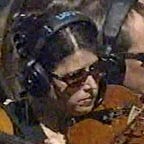Listening Friday: James MacMillan, “The Confession of Isobel Gowdie”
“The Confession of Isobel Gowdie,” is the work that propelled Sir James MacMillan from a young unknown Scottish composer to a prominent British composer.
Isobel Gowdie was a young Scottish woman from Nairn who was accused being a witch in 1662. After being tortured, Gowdie confessed to being “baptised by the devil” and that “she had journeyed to the centre of the earth to feast with the King and Queen of the fairies.”¹ She was subsequently strangled and then burned in pitch, “amid scenes of hysterical fright and sadism.”
MacMillan believes that she had gone mad as she was being tortured and confessed to horrific and fantastical acts in her delirium. He also wonders if her chief crime, along with other women who shared her fate, was simply that she was a woman who had not ceased following ancient folk and Catholic practices such as praying to saints and putting milk out for the fairies. In this light, this is both the requiem that she never received and an admonition that such heinous practices should never happen again.
“The Confessions of Isobel Gowdie,” became well known to North American listeners partly because Marin Alsop championed the piece and conducted it with a number of North American Orchestras. As she describes the work, it is “about all those who are castigated simply for being different.”²
I’m going to include two videos. The first is The London Symphony Orchestra’s recording, conducted by Sir Colin Davis.³ The second video is a BBC mini-documentary on “The Confession of Isobel Gowdie” from the 1990 Proms, which features a young James MacMillan (I almost didn’t recognize him!).
- James MacMillan, “The Confession of Isobel Gowdie: Composer’s Notes,” Boosey & Hawkes website, 1990, https://www.boosey.com/cr/music/James-MacMillan-The-Confession-of-Isobel-Gowdie/3115.
- Anne Midgette, “A Night of Power that Came and Went,” NYTimes website, October 15, 2005, https://www.nytimes.com/2005/10/15/arts/music/a-night-of-power-that-came-and-went.html.
- If you want to follow along with the score, you can go to Boosey & Hawkes website and sign in to see the score online: https://www.boosey.com/cr/perusals/score?id=1376.
